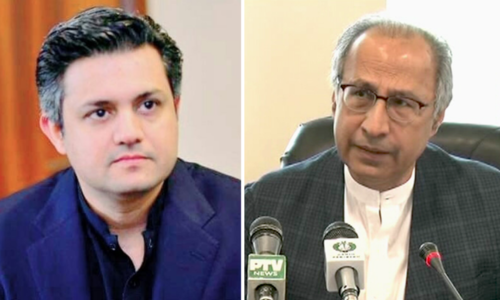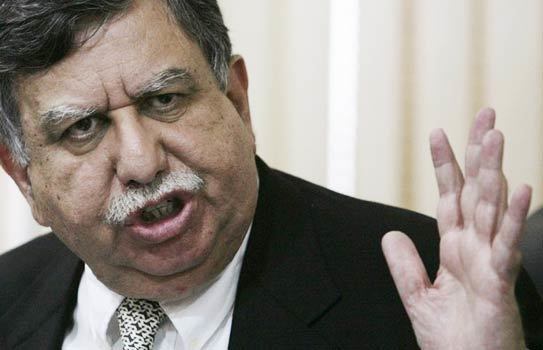FINANCE is such a fool’s gold.
Ask Asad Umar. He embraced it with all his heart and was spurned for it. Ask Hafeez Sheikh. He sculpted it with his experienced hands and was banished for it. Ask Hammad Azhar. He cradled it for a mere 24 hours and he has been chastised for it. There’s something about Q Block that disagrees with good men (and women).
Hammad Azhar is one of the redeeming features of PTI. Young, articulate, capable, electable and loyal — what else could Imran Khan want in a team member? Armed with strong political lineage and elite educational credentials, Hammad has performed well in government — performance being a subjective matter nowadays — and earned the praise of his leader.
The suddenness with which Hafeez Sheikh was evicted from the finance minister’s office — and the manner of this eviction — came as a rude shock to most. What was not a rude shock, however, was the prime minister’s decision to replace Sheikh with Hammad. It was a bold decision, but not a surprising one.
The finance minister did not deserve this confusion on the first day of his new job.
On his first day as arguably the most important minister in the federal government, Hammad chaired the meeting of the Economic Coordination Committee. Among the long and exhaustive agenda was the matter of importing sugar and cotton from India. The summary was moved by the commerce ministry and okayed by the prime minister because he also holds the portfolio of minister of commerce. The summary made economic sense. Importing these items from India would have meant Pakistanis would have them at lower prices.
Read: What makes a minister?
The ECC decided to give the go-ahead for the import of sugar and cotton from India. The new finance minister addressed a press conference and made the announcement. It made international news. There was, however, a problem. The ECC decisions — call them recommendations — have to be approved by the federal cabinet. This particular decision entailed an exemption from the ban on trade with India. Only the cabinet can allow such an exemption.
This wasn’t Hammad’s decision. But as chairman of the ECC, he became the face of this decision. When the announcement made waves, some cabinet members tweeted that only the cabinet could make this call and not the ECC. What prompted such a clarification? Was it the traction that the ECC announcement got in the news media? Was it a realisation that the announcement was being misconstrued as a decision of the government of Pakistan? Hammad did not deserve this confusion on the first day of his new job.
The commerce ministry had been working on this proposal to import sugar and cotton from India for a while. The summary must have been an outcome of some approvals by the higher authorities. Then the summary would have been routed to the Prime Minister’s Office where the relevant officials would have combed through it for any problems. However, in this case it is not necessary that the prime minister actually read and signed the summary because — according to a cabinet minister — many approvals are part of routine procedures that the staff at the Prime Minister’s Office processes on its own.
So what went wrong? It was a heavy agenda day for the ECC and the new finance minister was moving swiftly from item to item. When the summary for the import from India came up, Hammad was smart enough to ask how this could be approved without the go-ahead from the highest quarters. At this point, one senior minister present in the meeting raised a valid point. He said the ECC was the wrong forum for this decision and that it had to be cleared at the strategic level. Another adviser endorsed this point. However, the relevant adviser replied that the prime minister had already approved it. The new finance minister had no choice but to green-light it since he had no reason not to believe the concerned adviser about the prime minister’s approval.
It turns out that the situation was a bit different. The consultation necessary for such a strategic decision had not been done. The official explanation given now is that the ECC is an economic body and therefore it did not need to have looked at the strategic aspect as long as the economic aspect made sense, which it did. However, by all accounts the proper thing would have been to not bring the issue to the ECC till there was a strategic consensus on the matter. The commerce ministry did not do its due diligence. Hammad was needlessly left holding the baby.
A day after this avoidable fiasco at the ECC and the fiery cabinet meeting the next day in which the foreign and interior ministers chewed out the ECC for the announcement, TV screens turned crimson with the breaking news that the government was considering appointing former finance minister Shaukat Tarin as either an adviser on finance or a finance minister after getting him elected through the Senate. For the entirety of the day the news was not denied and later Tarin himself acknowledged that he had been approached by the government.
Could there be anything worse than a new finance minister learning on the second day of his job that he may have the company of a ‘minder’? It made for terrible optics. Hammad did not deserve this. A cabinet minister was absolutely right when he told relevant people in the government: “Let Hammad take his decisions, please do not second guess him now that you have given him the responsibility.”
Being Hammad Azhar has not been easy this week. Now that the prime minister has taken the bold decision to entrust him with this huge responsibility, he needs to stand fully behind him.
The writer is Dawn’s resident editor in Islamabad.
Twitter: @fahdhusain
Published in Dawn, April 3rd, 2021

















































